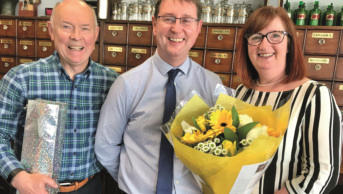
Corrinne Burns
The Royal Pharmaceutical Society (RPS) Welsh Pharmacy Board (WPB) gathered for their second meeting of the year at Stradey Park Hotel, Llanelli, on 4 April 2019. Andrew Morris, head of pharmacy and professor of pharmacy education at Swansea University Medical School, and Malik Latif, local coordinator for RPS Aneurin Bevan, were guests at the meeting. Also present at the meeting were Paul Bennett and Ash Soni, chief executive and president of the RPS, respectively, and Robbie Turner, the Society’s director of pharmacy and member experience.
The evening before the meeting, the board had hosted a meet and greet during, where members of the RPS joined the board for dinner. Suzanne Scott-Thomas, chair of the WPB, said that she hoped that this first meeting outside of the RPS Cardiff offices showed that “we are connecting more with members, and not being too Cardiff-centric”.
She said the Society may pursue the same idea in 2020, perhaps in a North Wales location.
Departure
Opening the meeting, Scott-Thomas said that Mike Curson had resigned from the board owing to other commitments and noted the board’s thanks to Curson for his time. His absence left a casual vacancy in the primary care sector place. Following governance process, the position will be filled after the upcoming national pharmacy board elections: the non-elected candidate in primary care with the highest votes will fill the vacancy for two years. If there is no such candidate, then a member will be co-opted to fil the position.
Scott-Thomas also noted that during the board’s working day, held on 3 April 2019, WPB members were given refresher training on how to be Dementia Friends.
Director’s report
Mair Davies, RPS director for Wales, said that the Society had met with Social Care Wales (SCW) and Healthcare Education and Improvement Wales (HEIW) to plan a piece of work on the social care workforce commissioned by Keith Moultrie, director of the Institute of Public Care at Oxford Brookes University.
The RPS was due to attend a joint SCW/HEIW workshop the day following the board meeting, and was due to meet Moultrie towards the end of April 2019.
Davies also confirmed that at the Board’s working day, held on 3 April 2019, it had been agreed that RPS Wales will work towards a policy on mental health in the workplace over the next 12 months, alongside the Scottish and English Pharmacy Boards to develop a Great Britain-wide campaign.
The work to develop the policy will be led by Wendy Davies, a mental health specialist pharmacist. Davies is also one of three new members of staff who have joined RPS Wales on a part-time basis to cover the maternity leave of Elen Jones, policy and practice lead at the RPS (who has since been appointed as director of Wales, taking over from Mair Daies who will retire in July 2019). The other two new members of staff covering Jones’s maternity leave are Karen Hodson, who will work on palliative care, and Mo Abdelkafi, who will focus on artificial intelligence, robotics and personalised medicine.
RPS Wales is also working with the Royal College of GPs in Wales on a joint paper, ‘Multidisciplinary team working in primary care: making it work in general practice’. The guidance in the paper has been drafted following a joint workshop between the two bodies, held in September 2018, on the same theme.
Update on Swansea MPharm
Andrew Morris, head of pharmacy and professor of pharmacy education at Swansea University Medical School, who is leading the team tasked with designing Swansea’s new MPharm degree, the first in Wales for a century. He updated the board on the progress of the course, which is due to see its first intake in September 2021.
Morris explained that the fourth year of the degree is being designed to allow modules to be moved around, in case the General Pharmaceutical Council (GPhC)’s proposals for an integrated five-year degree go ahead. The design will allow workplace experience to be delivered in two six-month blocks.
Morris also explained that he would like summer vacation work, to be undertaken between the second and third year, to be credited. The team also plans to include an “expanding horizons” option, under which students will be able to take any additional Swansea University module: for example, a language.
Morris said that the GPhC is happy with this idea and that he would welcome input from the RPS as a stakeholder.
Asked by Bennett why Swansea had not elected to go for a sandwich-type degree (in which students complete a year of work experience between their third and fourth years), Morris responded that such degrees required close work with a select number of partners, and consequently students may be limited to certain locations or areas of work.
Board member Sudhir Sehrawat asked if students might “struggle to find preregistration placements”, to which Morris responded that with funding being limited, it is potentially an issue.
Following a question from Mair Davies on how the development of a UK-wide foundation training programme would impact the course design, Morris said that Swansea “need to work with [the RPS] on that”. A UK-wide foundation training programme is part of a wider workplan to develop pharmacy postgraduate education and training. The plans are currently being developed by the Education Governance Oversight Board (EGOB), which is chaired by Peter Kopelman and includes the UK’s four chief pharmaceutical officers, as well as representatives from the RPS, the GPhC, NHS Education and Training, universities and employers.
- The next Welsh Pharmacy Board meeting will be held on 12 June 2019.


